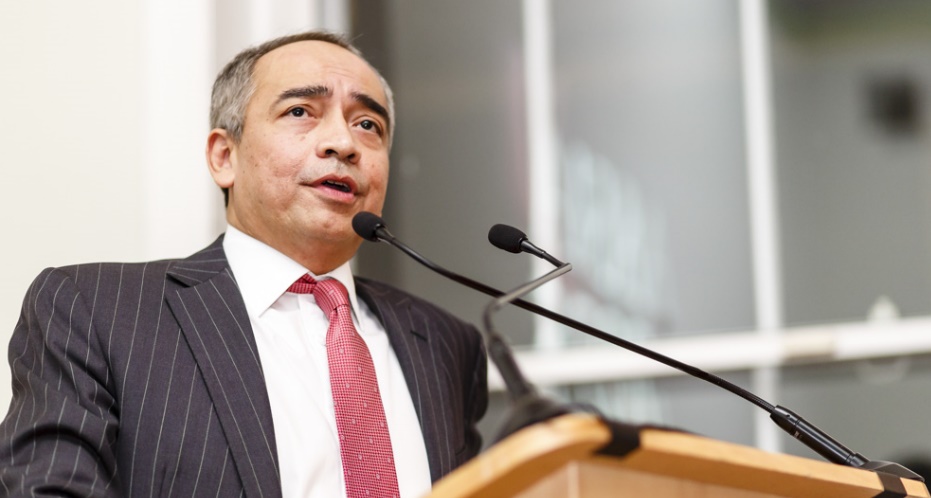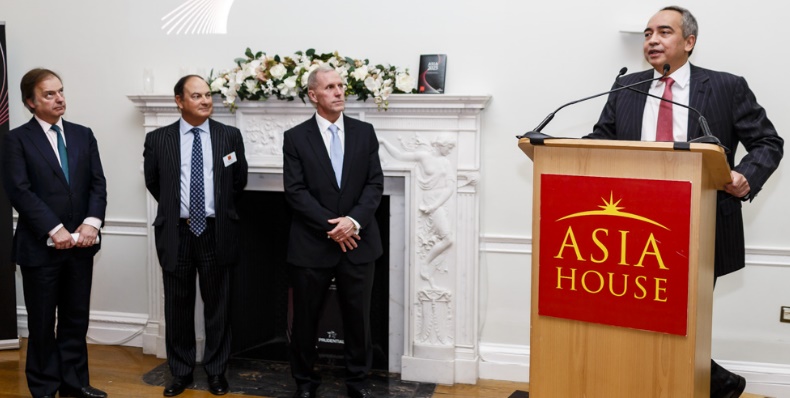Driving commercial and political engagement between Asia, the Middle East and Europe
Driving commercial and political engagement between Asia, the Middle East and Europe
Driving commercial and political engagement between Asia, the Middle East and Europe

2016 will be a slow year for continued integration of the Association of Southeast Asian Nations (ASEAN) bloc but the region should watch carefully and learn from what happens with Brexit, the chairman of one Asia’s largest investment banks, has said.
Nazir Razak, Chairman of Malaysia-headquartered CIMB Group, a leading ASEAN Universal bank, made the remarks during a speech he made at the launch of the Asia 2025 publication at Asia House on Tuesday night [8 March, 2016].
Mr Razak, who is one of the contributors to the new book, which is sponsored by Prudential, said he was very disappointed by the slow progress of ASEAN integration, but at the same time immensely proud of what had been achieved since the bloc’s formation in 1967.
“I wrote about ASEAN in the book and since that article there has been an important milestone. On 1 January 2016 we became an ASEAN Community,” he stated.
But he admitted that his thoughts on this milestone were contradictory: he felt a sense of both disappointment and of progress.
Mr Razak said the ASEAN Community promised in the 2007 ASEAN Charter, especially with regards to the ASEAN Economic Community (AEC) realised at the end of 2015, had been to create a single production base, with a free flow of trade, goods and services and skilled labour and investments across the region.
“This has still not been achieved,” the 49-year-old said.
Intra-regional trade remains at just 24 per cent, he pointed out. Non-trade tariffs remained rather high, he said. Travel between ASEAN Member states was still difficult and the various ASEAN stock exchanges were still not fully integrated with trading links which, if they were, would make it possible for the public to invest across borders easily. “Only three countries have signed up,” he said.
The ASEAN Banking Framework was currently based on bilateral regulations between various central banks, so not a regional framework, he added.
“There is so much that still needs to be done versus what was promised in 2007,” the 2015 Asian Business Leaders Award winner said.
“We also need to look at Europe and what happens with Brexit and learn the hard lessons from that on what to do and not to do and then come up with an implementation plan that is suitable for ASEAN,” he continued.
The British public will vote on whether they wish Britain to stay in the European Union at a referendum being held on 23 June this year.
However the banking stalwart pointed out that there was progress to celebrate too. He said ASEAN had developed immensely since 1967.
He said back in the 1960s ASEAN was “not a very nice region to live in” with “real border tensions” and open conflict particularly between Malaysia and Indonesia.
The countries that make up ASEAN today are very diverse in terms of economic development, ethnic groups, religions so “the raw material for ASEAN was very poor indeed” he said. “But today in 2016 we call ourselves a community and that’s a great achievement,” he said.
“Tariffs are close to zero, every day there is a growing number of ASEAN multinationals and a growing number of global MNCs looking at ASEAN as one region. We are a US$2.6 trillion economy, the seventh largest in the world and growing very fast. There is lots to be proud of,” he added.

The RT Hon Hugo Swire MP, Minsiter of State for Foreign and Commonwealth Affairs, Paul Manduca, Chairman of Prudential and Michael Lawrence, Chief Executive of Asia House are pictured standing on the left as Nazir Razak, Chairman of CIMB Group delivers his speech at the launch of ‘Asia 2025.’. Image credit: Miles Willis Photography
However, the ASEAN 2025 blueprint was much more realistic, he said. “It doesn’t talk about a single production base anymore, rather a more integrated and cohesive economy across the region. I think that blueprint is a great deal more realistic, yet there is not yet an implementation plan and we have not really discussed some of the hard stuff about integration which even Europe will be familiar with.”
He said the critical issues that remained to be addressed if ASEAN was really going to “get serious about achieving ASEAN 2025, were the tensions between integration and sovereignty, the legal framework for ASEAN – what do you do if a country does not comply with what it promised in its ASEAN agreements? – and the much-needed empowerment of the ASEAN Secretariat. “It’s still running on a US$17 million budget,” he said. “We don’t want to give them as much as Brussels, but it certainly need more than that.”
In his speech Mr Razak, who is brother of the prime minister of Malaysia Datuk Seri Najib Razak, predicted 2016 would be quite a slow year for continued ASEAN integration. Laos took over chairmanship in January 2016.
“I am optimistic about 2017. That is ASEAN’s 50th birthday and I think that will bring a new push for integration,” he said. The Philippines will assume the chairmanship in 2017.
He pointed out that ASEAN would be chaired by Singapore in 2018. “Singapore is a country that prides itself on being very efficient so we hope that there will be another surge of activity in terms of integration in 2017 to 2018. It’s imperative that we continue the momentum of ASEAN integration, ” he said. But he pointed out there were lots of ASEAN skeptics and competing agendas too, for example TPP [the Trans-Pacific Partnership] and the One Belt One Road (OBOR).
“It’s dangerous if countries in ASEAN prioritise TPP or OBOR above ASEAN integration as if they do there is a danger of ASEAN stalling and if this engine stalls it will be quite difficult to ramp it up again,” he added.
To see a slideshow of the event click below:-
Asia 2025 is a is a glossy black book that contains a unique collection of 25 informed opinion pieces from 25 prominent voices offering their forecast on the next decade in Asia.
More than 100 business leaders, members of the Asian diplomatic community, and British government representatives joined the launch event of the book which was held at Asia House. They were each given a copy of the book. The speeches were followed by a networking reception.
naomi.canton@asiahouse.co.uk
If you interested to find out more about Asia 2025 please email samantha.deave@asiahouse.co.uk.
To read about the launch of Asia 2025 click here.
To see what the Rt Hon Hugo Swire MP said in his speech at the launch of Asia 2025 click here.
To find out more about Asia House publications click here.
To read an exclusive interview that Asia House carried with Nazir Razak click here and here.
To read about the Asian Business Leaders Award click here.
